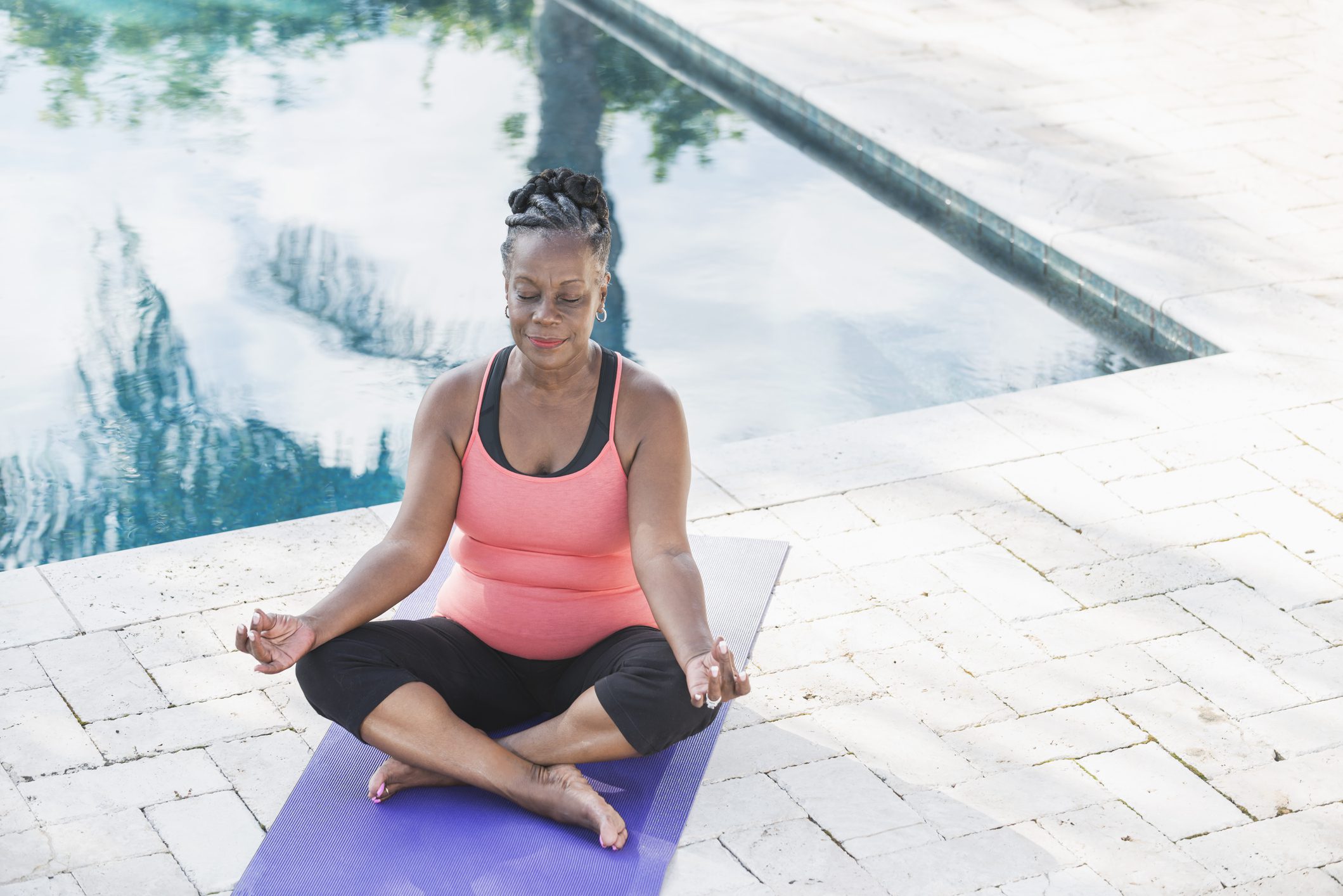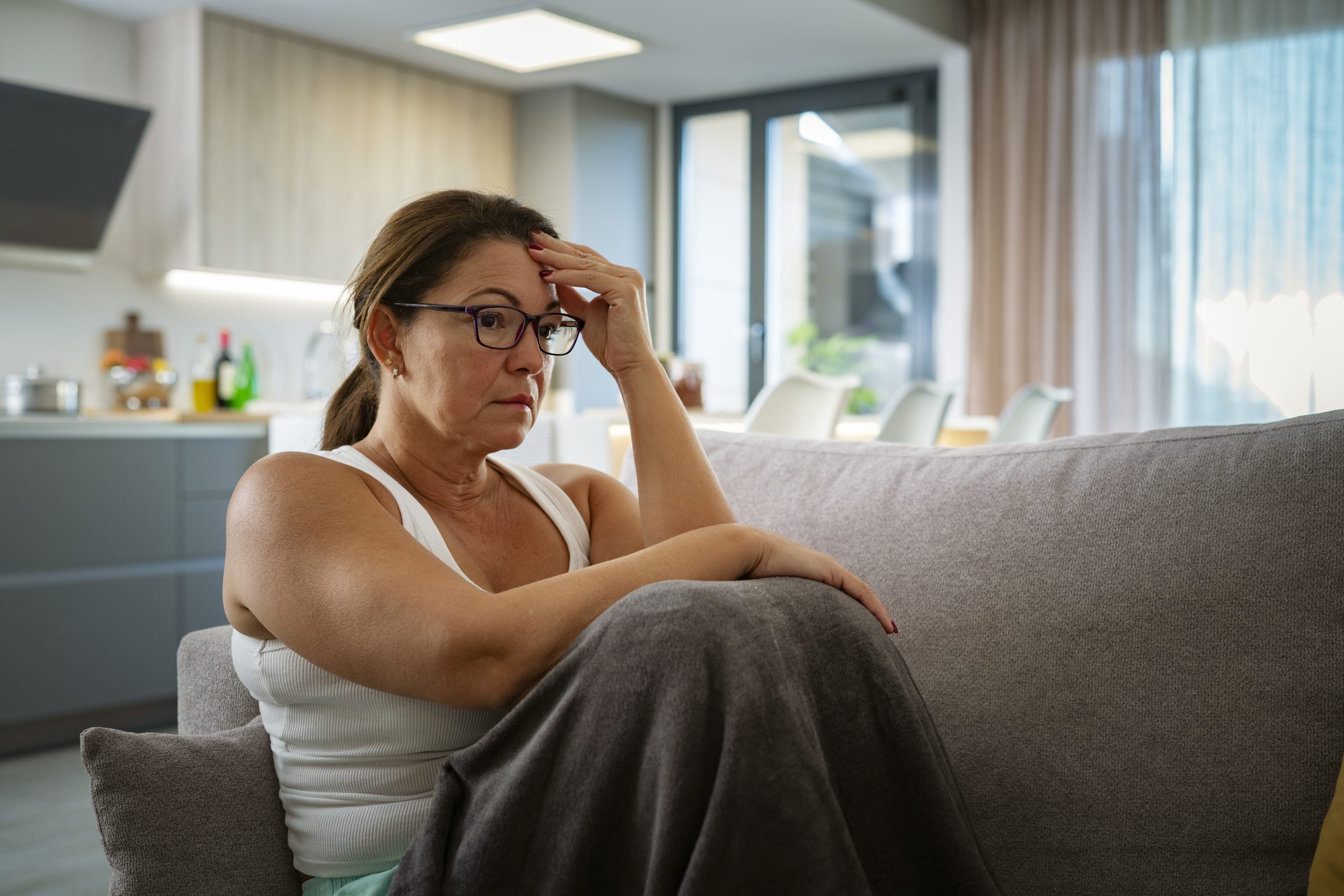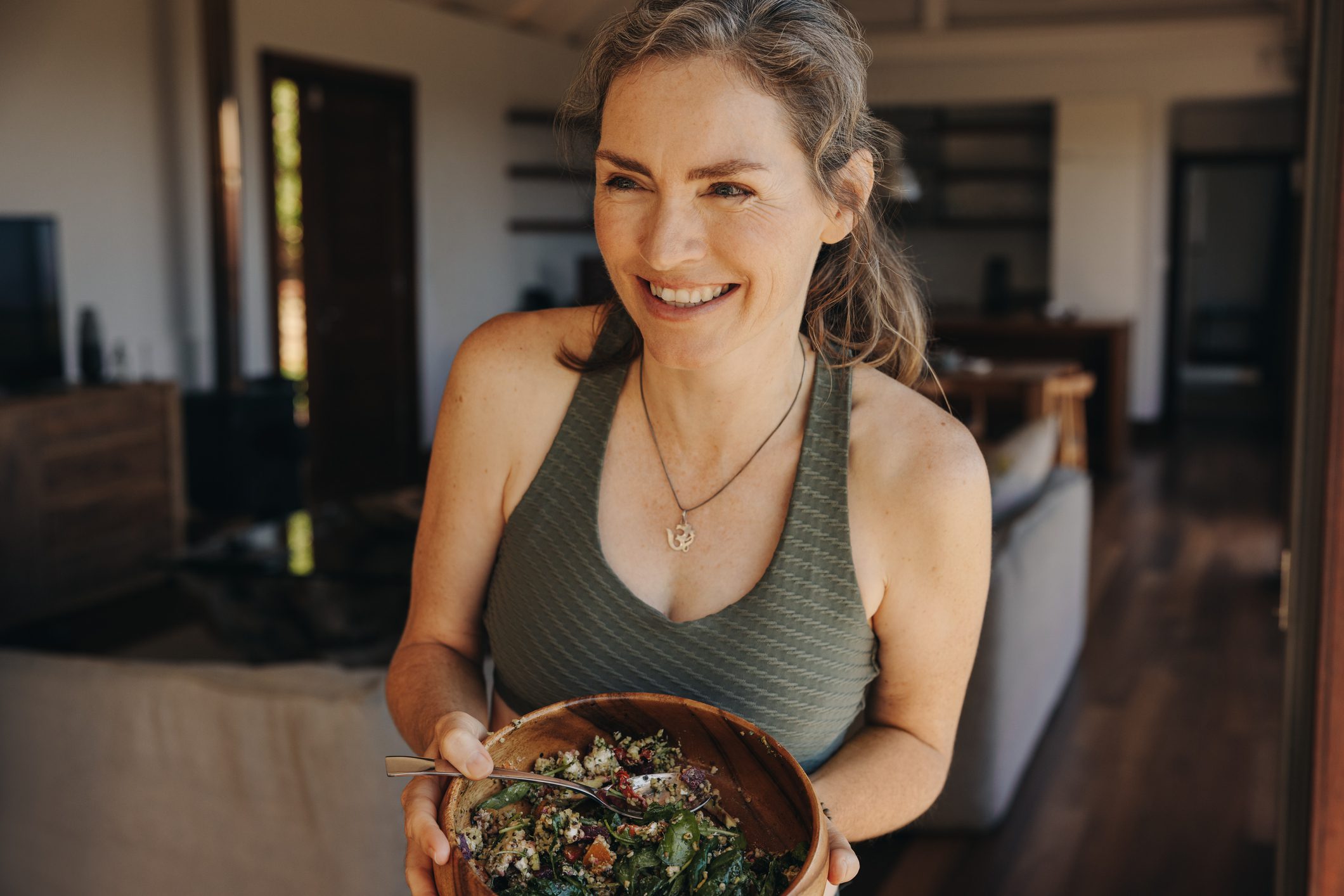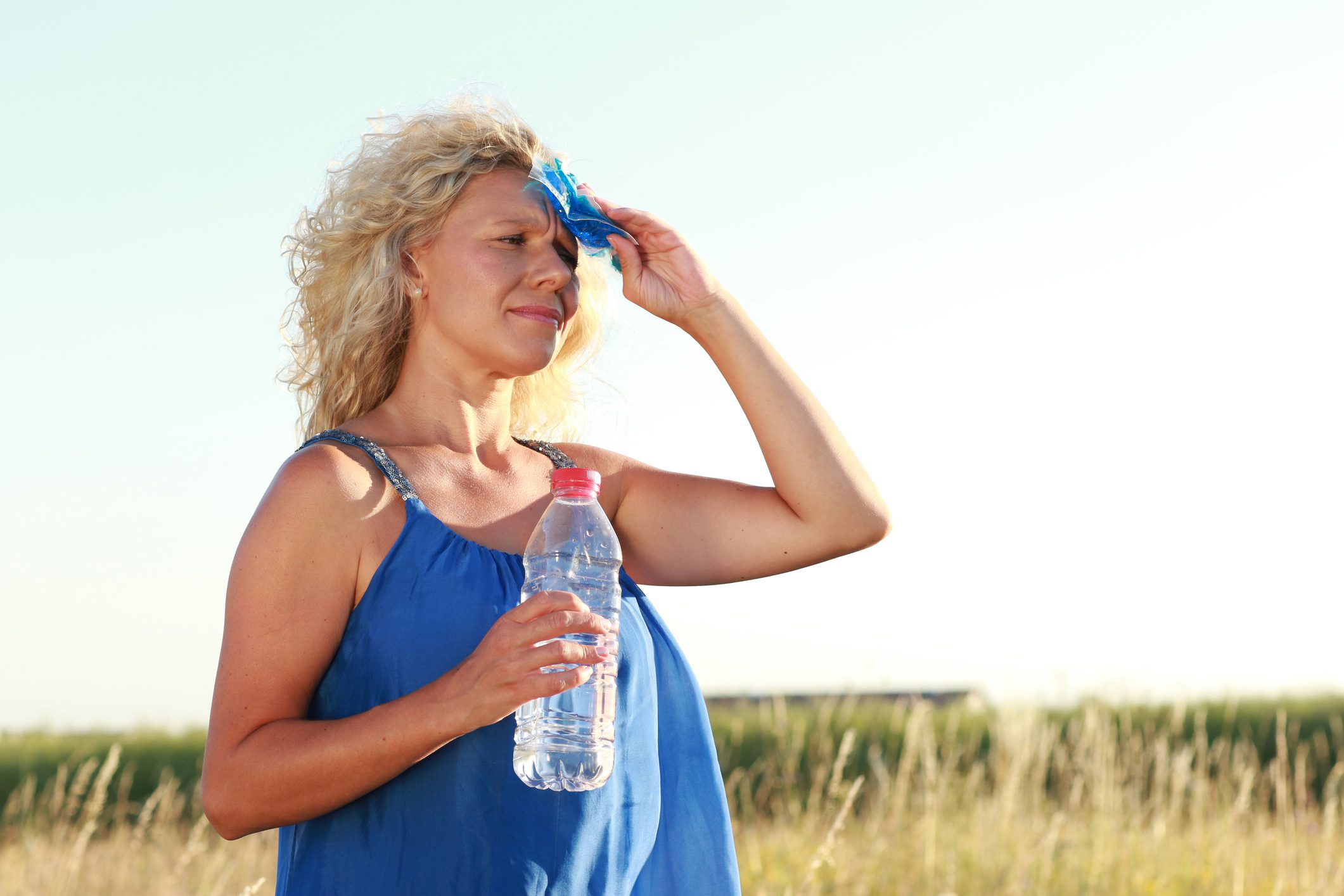Stress doesn’t have many redeeming qualities. There is the concept of eustress—that type of stress that feels painful or difficult in the moment, but is exhilarating and pushes you to new heights once you’ve done it. You know, that tough workout that leaves you stronger, or the terrifying work presentation that ends in a promotion.
But one of stress’s many bad qualities? It really ages you. And while I’m thoroughly enjoying aging powerfully into my 60s and consider growing older to be a giant privilege, I don’t want to feel stressed and feel all the negative side effects of aging!
So how do I beat stress to keep both my mind and body feeling vibrant, especially in a world that rewards non-stop hustle and 24/7 connectivity? It’s taken decades of practice, but I’ve figured out the stress-management practices that keep me young.
How Stress Ages You
I’m going to share my anti-aging stress-busters with you here. But first, let’s look at a few of the ways stress accelerates the aging process:
- It can cause physical signs of aging. Stress really can give you gray hair. Researchers have found that in addition to depleting the stem cells that give your hair its pigment,1 stress can also lead to poor sleep that accelerates other physical signs of aging like wrinkled or dry skin.2
- It leads to or exacerbates chronic inflammation. Stress and chronic inflammation are inextricably linked. When you’re in a prolonged state of stress, your body releases extra cortisol and adrenaline, which can lead to inflammation. Over time, that will also cause oxidative stress, which can damage certain tissues in your body and speed up the aging process.3 Conditions like inflammation can then contribute to other debilitating issues like cardiovascular disease and type 2 diabetes, only causing more physical and mental stress for you as you deal with these illnesses. In short, preventing stress goes hand in hand with preventing chronic inflammation.
- It can increase your biological age. Thanks largely to inflammation and cell damage, stress can make a giant enough impact on your body that it increases your biological age.4 Biological age indicates not how many years you’ve lived, but how old your body acts or feels. A higher biological age means you’re undergoing accelerated aging, and may feel the negative side effects of age earlier than your peers.
Losing collagen with age is another contributor to looking and feeling older than your years. That’s why I supplement daily with Collagen Peptides Powder. Along with strengthening bone density, it’s great at keeping a youthful glow in your hair, nails, and skin. It doesn’t have a taste, so it’s a simple way to increase protein without altering the flavor of your meal—I add it to smoothies, coffee, soups, sauces, and more!*
Stress Management to Stay Young
It’s not all doom and gloom when it comes to stress and aging. The same study that looked at stress reversing your biological age also found that age is more dynamic than we previously thought—and that reducing stress could take that biological age back down.
So how do you actually eliminate stress and stay young in body, mind, and soul? Let’s look at my favorite ways.
1. Have a Positive Outlook on Aging
Milestone birthdays can be daunting for tons of reasons—not least of which because we live in a society where aging women tend to get ignored or treated as if we’re no longer capable of strength, beauty, or success.
I found that once I laughed off those stereotypes, embraced a positive attitude about aging powerfully, and genuinely looked forward to my 60th birthday, I was able to get into the best shape of my life, enjoy new experiences, and be truly excited about exactly where I am in my life.
It turns out the science is completely behind me on this one. A recent study found that people with positive perceptions on aging added an average of 7.5 years to their life, compared to people who dreaded the hands of time.5 Be excited about life at every stage, and you’ll be able to live it!
Remember, growing older is something we get to do, not something we have to simply endure. When you’re feeling down, list a few things that you’re grateful for, put yourself outside your comfort zone to try a new experience, or reach out to a good friend you haven’t chatted with in a while. They may all serve as great reminders of the many things you love about your life.
2. Meditation
I was skeptical about meditation for years. Sure, I had friends who sang its praises. But I simply couldn’t believe that giving up 20 or more minutes of my day to simply sit still could be beneficial to me in any way.
Well, I’ll be the first to admit I was wrong. During a stressful period in my life, I realized that I’d gained weight without having changed my diet or exercise habits at all, and that I wasn’t as focused as I wanted to be. The only culprit? Stress.
I decided to commit to six months of a daily meditation habit to alleviate some of that stress. I wish I could say it worked overnight, but it didn’t. It took the bulk of that six months of practice, and then it just clicked.
Forms of meditation have been practiced for millennia, and we’ve only just begun to take a scientific look at it. But there’s still tons of data that highlight its benefits. One study found that practicing mindfulness meditation helped lower markers of stress including cortisol, blood pressure, and triglycerides.6
Meditation also helps you keep your life in perspective while also looking forward to what’s ahead—and what gives you a younger state of mind than being excited about the many adventures and milestones to come?
I love guided meditations and retreats from my pal Dr. Joe Dispenza,** but there are tons of free and affordable resources out there to find the meditation style that works for you.
Check out playlists on YouTube or Spotify for guided meditations. You can be specific in your search—maybe you want one you can do while on a walk, or one that focuses on a specific aspect of your life, like self-acceptance or better focus. Don’t be afraid to try out different styles and find one that fits you.
3. Going Hard When You Exercise (and Seeing Results by Eating Protein First)
There’s nothing wrong with a peaceful walk or some restorative yoga. But the workouts that really keep you young are the more intense ones that involve heavy lifting and getting your heart rate up.
For one, lifting helps you counteract the bone strength and density loss that you start to experience as you age.
Starting as early as your 30s (though it’s more common closer to your 50s or 60s), a gradual deterioration of muscle mass can begin. The average person can lose 3-8% of their muscle mass per decade after 30, accelerating after 60.7 This loss can slow you down, and lead to or exacerbate frailty, which is unfortunately a strong predictor of both needing acute care and of early mortality.8
I counteract that loss in two ways. First, I work out. Along with a heavy lifting routine that I’ve progressively built with the help of a trainer, I do some HIIT classes that include movements like burpees, push-ups, squats, and bursts of cardio like sprints or box jumps.
The lifting routine helps build my muscles. And along with being great for my strength and endurance, researchers have found that the bursts of energy you do in a HIIT workout can stimulate your “happy” hormone, serotonin, to boost mental health and focus.9 Plus, promising research has shown that HIIT may also be a tool for improving the neuroplasticity that decreases with age, making it a truly great way to train the mind and body!10
But remember, I said I do two things to counteract muscle loss. All my work at the gym would be completely null if I weren’t backing it with a diet where I eat protein first at every meal.
Eating protein first at every meal has tons of anti-aging benefits. For one, it fills you up, meaning you won’t need to reach for food your body doesn’t need, helping you keep off unwanted weight that can feel more stubborn as you age.
You also simply can’t maintain or build muscle mass without protein. When you work out, your muscles get tiny tears in them that require rebuilding—and the builder is protein. If you’re not getting enough, you’ll never be able to see results from your workouts, and you’ll continue to lose your muscle mass despite putting your body through grueling exercise.
Not sure how much protein YOU need in a day? I designed a handy calculator to help you figure out your personal needs, and when you use it, I’ll send you my FREE 7-Day Eat Protein First Challenge. I designed it to show you just how easy—and life-changing—focusing on protein first can be for your energy, your waistline, and your overall health.*
4. Sharing Yourself With Others
Getting outside of your head and into the real world to volunteer or share yourself with others has huge mental and physical benefits as you age. Not only does it fill you with a sense of purpose and keep your body active, but it can combat the isolation that can come with age.
One study found that older women enrolled in a program where they helped young students had improve neuroplasticity after six months of volunteering.11 Another found that the potential for social interaction, a sense of belonging, and a purposeful activity helped seniors increase their satisfaction and happiness with life.12 And remember what I said about that positive outlook? It’s only going to lengthen your life!
Volunteering doesn’t have to be anything official or super time-consuming. Seemingly simple acts like running a few errands for an immobile neighbor, sending a homemade card to a friend, or picking up trash at your local park are all low-effort tasks that can make a giant impact on your community and your health.
Taking Stress Seriously
Now that I’ve shared my favorite stress relievers, I want to leave you with two final thoughts.
First: These are the stress-busters that work for me. You don’t have to adopt mine—in fact, you shouldn’t force anything that would only cause you more stress. Find the ones that ease your body and mind. Maybe it looks more like yoga, long walks at a park near your house, peaceful baths with your favorite novel, or blasting the speakers and dancing by yourself for an hour!
And when you do find what works for you, stick with it. Don’t think of it as an indulgent practice you get to enjoy only when you have a free moment.
Let’s say your doctor prescribed medicine for high blood pressure or said you had to wear a cast to heal a broken ankle. You wouldn’t only take that medicine when you had time, or break off your cast early, right? Treat your stress management the same way—like a serious prescription for your health. Only then will you see the benefits of your stress-management practices and enjoy the incredible life you have ahead of you.
If you’ve tried some of these practices but are still having trouble finding relief, Take Ten Stress Support can help. It’s formulated with GABA, a key neurotransmitter that gives your brain the tools it needs to respond to stressful situations calmly and efficiently. You can’t predict what storms are ahead, but you can be ready for them with Take Ten on your side.*
*These statements have not been evaluated by the Food & Drug Administration. Products mentioned are not intended to diagnose, treat, cure, or prevent any disease. The views in this blog by JJ Virgin should never be used as a substitute for professional medical advice. Please work with a healthcare practitioner concerning any medical problem or concern.
**I couldn’t make it without supportive relationships, and I bet you feel the same! That’s why my team and I offer you products and services we believe in. If you happen to purchase something I recommend here, I may receive some kind of compensation. However, I only bring you partners whose content and core values will serve you with the same commitment to excellence my team and I strive for every day. Please be in touch with any concerns.
Sources:
- Zhang, B., Ma, S., Rachmin, I., He, M., Baral, P., Choi, S., Gonçalves, W. A., Shwartz, Y., Fast, E. M., Su, Y., Zon, L. I., Regev, A., Buenrostro, J. D., Cunha, T. M., Chiu, I. M., Fisher, D. E., & Hsu, Y. C. (2020). Hyperactivation of sympathetic nerves drives depletion of melanocyte stem cells. Nature, 577(7792), 676–681. https://doi.org/10.1038/s41586-020-1935-3
- Oyetakin-White, P., Suggs, A., Koo, B., Matsui, M. S., Yarosh, D., Cooper, K. D., & Baron, E. D. (2015). Does poor sleep quality affect skin ageing?. Clinical and experimental dermatology, 40(1), 17–22. https://doi.org/10.1111/ced.12455
- Yegorov, Y. E., Poznyak, A. V., Nikiforov, N. G., Sobenin, I. A., & Orekhov, A. N. (2020). The Link between Chronic Stress and Accelerated Aging. Biomedicines, 8(7), 198. https://doi.org/10.3390/biomedicines8070198
- Poganik, J. R., Zhang, B., Baht, G. S., Tyshkovskiy, A., Deik, A., Kerepesi, C., Yim, S. H., Lu, A. T., Haghani, A., Gong, T., Hedman, A. M., Andolf, E., Pershagen, G., Almqvist, C., Clish, C. B., Horvath, S., White, J. P., & Gladyshev, V. N. (2023). Biological age is increased by stress and restored upon recovery. Cell metabolism, 35(5), 807–820.e5. https://doi.org/10.1016/j.cmet.2023.03.015
- Levy, B. R., Slade, M. D., Kunkel, S. R., & Kasl, S. V. (2002). Longevity increased by positive self-perceptions of aging. Journal of personality and social psychology, 83(2), 261–270. https://doi.org/10.1037//0022-3514.83.2.261
- Pascoe, M. C., Thompson, D. R., Jenkins, Z. M., & Ski, C. F. (2017). Mindfulness mediates the physiological markers of stress: Systematic review and meta-analysis. Journal of psychiatric research, 95, 156–178. https://doi.org/10.1016/j.jpsychires.2017.08.004
- Volpi E, Nazemi R, Fujita S. Muscle tissue changes with aging. Curr Opin Clin Nutr Metab Care. 2004;7(4):405-410. doi:10.1097/01.mco.0000134362.76653.b2
- Hao, Q., Zhou, L., Dong, B., Yang, M., Dong, B., & Weil, Y. (2019). The role of frailty in predicting mortality and readmission in older adults in acute care wards: a prospective study. Scientific reports, 9(1), 1207. https://doi.org/10.1038/s41598-018-38072-7
- Martland, R., Korman, N., Firth, J., Vancampfort, D., Thompson, T., & Stubbs, B. (2022). Can high-intensity interval training improve mental health outcomes in the general population and those with physical illnesses? A systematic review and meta-analysis. British journal of sports medicine, 56(5), 279–291. https://doi.org/10.1136/bjsports-2021-103984
- Mellow, M. L., Goldsworthy, M. R., Coussens, S., & Smith, A. E. (2020). Acute aerobic exercise and neuroplasticity of the motor cortex: A systematic review. Journal of science and medicine in sport, 23(4), 408–414. https://doi.org/10.1016/j.jsams.2019.10.015
- Carlson, M. C., Erickson, K. I., Kramer, A. F., Voss, M. W., Bolea, N., Mielke, M., McGill, S., Rebok, G. W., Seeman, T., & Fried, L. P. (2009). Evidence for neurocognitive plasticity in at-risk older adults: the experience corps program. The journals of gerontology. Series A, Biological sciences and medical sciences, 64(12), 1275–1282. https://doi.org/10.1093/gerona/glp117
- Dulin, P. L., Gavala, J., Stephens, C., Kostick, M., & McDonald, J. (2012). Volunteering predicts happiness among older Māori and non-Māori in the New Zealand health, work, and retirement longitudinal study. Aging & mental health, 16(5), 617–624. https://doi.org/10.1080/13607863.2011.641518






